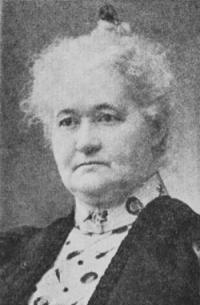Margaret Catharine Currie

Photo:FindAGrave.com
Margaret Catharine (Gill) Currie (poet, teacher, and Baptist) was born 14 June 1843 in Springhill, New Brunswick and died 7 August 1906 in Fredericton from illness associated with diabetes. She was the daughter of Thomas Gill, farmer and Methodist, and Catharine Gaynor, housewife and immigrant from Ireland. They lived in a two-storey stone house built by her grandfather, Lieutenant Thomas Gill of the Maryland Loyalists. The 1851 census of York County indicated that they had two servants in their household; one of Irish descent and one of African descent.
In January 1861, she attended a Normal School in Saint John, NB. There, she received her class 1 license to teach in the western district of St. Mary's Parish. The 1861 census confirmed her status as a school teacher and a Baptist still residing with her father (Davies). In February 1864, she transferred her license to the southern district of the parish, teaching at Kingsclear and later St. Mary’s. On 2 November 1864, she married George William Currie of Kingsclear, N.B. Shortly after, they moved to Fredericton where they spent the rest of their lives. Together, they had two sons and two daughters. Although their financial situation was not prosperous, they were still able to send their sons to university and their daughters to normal school. One of their sons, Thomas H. Currie, was a distinguished graduate of New York University and became a member of their faculty shortly after. Once she moved to Fredericton, Currie contributed to periodicals such as the Saint John Globe and Stewart's Literary Quarterly Magazine.
Currie started writing poetry as a teenager, and she published her first book of poems, Gabriel West, and Other Poems, in 1866. Her literary career was influenced by the American Revolutionary War, the stories from which were passed to her by her father. Her first book is anchored by "Gabriel West," a poem about her grandfather's friend who lost his wife and child in a shipwreck before reaching New Brunswick during the Revolutionary War. “Gabriel West” is written with narrative flare, as the following establishes: "I love to pour on youth's attentive ear/ The tales I from my father used to hear; Traditions that his father treasured well/ Of what his comrades and himself befell" (4).The poem also reflects her pride in her province. The collection's forty other poems mostly “focus on her faith, nature, romantic love and the mystical” (Gill 284). The book was dedicated to the descendants of the Loyalists, still populous in the province.
In 1897, she published a verse narrative called John Saint John and Anna Grey, a long verse poem of lost love and another tribute to New Brunswick Loyalists. It resembles "...the style of Henry Wadsworth Longfellow's historical verse narratives while at the same time displaying conventions of 19th-century melodrama in its dark, tortured villains, its remote English country-house setting and is ambiance of madness" (Davies). The story is of John Saint John, the son of a prosperous Loyalist, who was brought to New Brunswick, where he meets Anna Grey, the daughter of John Saint John's father's less wealthy comrade. John Saint John and Anna Grey begin a romance, which soon breaks apart when Anna falls in love and marries an officer of the Garrison in Fredericton. The officer and Anna move to England where she is seen as being an indigenous woman from Canada and is therefore mistreated. She is forced into an insane asylum by her mother-in-law and released once her friends in New Brunswick find out. She then returns to New Brunswick and lies buried next to her lover, John Saint John. The poem offers the readers an insight into the domestic lives of the New Brunswick Loyalists, as well as a taste of the melodrama popular at the time.
Currie's work was well-received by critics. A review in The Canadian Magazine states that John Saint John and Anna Grey has a "smooth flow of the versification [and] is well maintained, but it seldom rises to noticeable beauty" (358). A critic from the Bookseller and Stationer also agreed that John Saint John and Anna Grey contained pleasing rhymes and that "it merits a circulation all over the Dominion" (4).
Monissa Comeau, Fall 2010
St. Thomas University
Bibliography of Primary Sources
Currie, Margaret Gill. Gabriel West, and Other Poems. Fredericton: H.A. Cropley, 1866.
---. John Saint John and Anna Grey: A Romance of Old New Brunswick. Toronto: William Briggs, 1897.
Bibliography of Secondary Sources
Davies, Gwendolyn. “Gill, Margaret Catharine (Currie).” Dictionary of Canadian Biography. Vol. 13. Toronto: U of Toronto P, 1994. Dictionary of Canadian Biography Online. 2000. U of T. 29 Feb. 2010
<http://www.biographi.ca/en/bio/gill_margaret_catharine_13E.html>.
Gill, Barbara J. Soul Gift: The World's Self-Help Book. Fredericton: Events Planning Associates, 2006.
Maxwell, Lilian M. The River St. John and Its Poets. Sackville, NB: The Tribune Press Ltd., 1947.
The New Brunswick Census of 1851: York County. Comp. Elizabeth Sewell and Elizabeth Saunders. Fredericton: Provinicial Archives of New Brunswick, 1979.
Rev. of John Saint John and Anna Grey. Bookseller and Stationer 13.7 (1897): 4.
Rev. of John Saint John and Anna Grey. The Canadian Magazine 9.4 (1897): 358.


